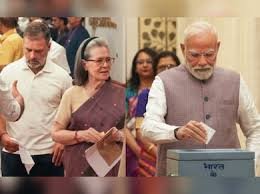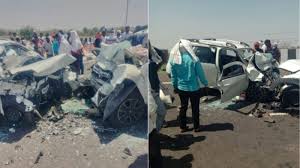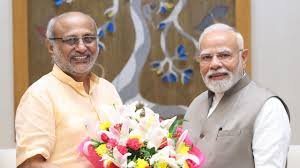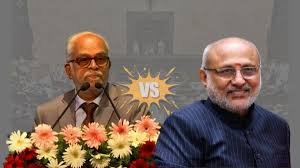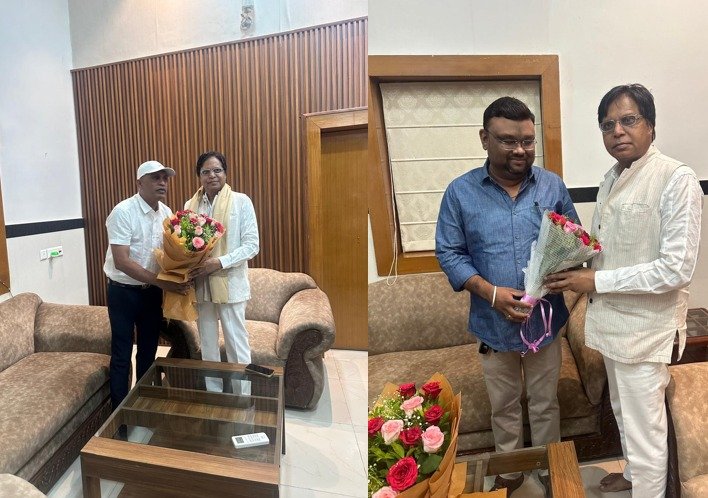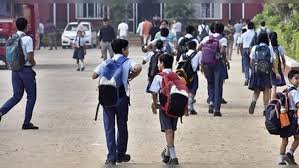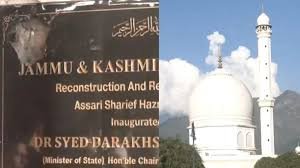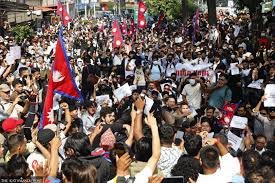
Youth protest against social media ban in Nepal: 'Gen Z Revolution' begins
Kathmandu: Youth in Nepal's capital Kathmandu have launched a rebellion against the government of K. P. Sharma Oli against the ban imposed on social media. Thousands of youth have protested in large numbers on the streets of the capital, and this movement has been named "Gen Z Revolution". This movement has seen a large participation of students and young people of the new generation. The protest has intensified after the Oli government banned several social media platforms including Facebook and Twitter last week. It has been reported that two people died during these protests.
Tension due to social media ban
The Nepal government has announced a ban on almost all major social media platforms including Facebook, Twitter and Instagram. Initially, there was displeasure and discussion on online forums against this decision. However, within some time, this displeasure went beyond the digital world and transformed into large-scale protests on the streets of Kathmandu. Thousands of young people have taken to the streets to protest the government's decision. "We want our freedom of speech," "Social media is our voice," they chanted.
'Gen Z Revolution' begins
The movement is being called the 'Gen Z Revolution' because it is largely made up of young people and students. The young people who gathered on the streets of Kathmandu have accused the government of 'anti-democratic' and 'an attack on freedom'. Students from universities and colleges in particular have been actively involved in the movement. "Social media is the expression of our generation. The government has tried to silence our voice by shutting it down," said a student.
Violent turn and death
The situation turned violent at some places during the protests. Two people are reported to have died in clashes between police and protesters. This has intensified the movement. Protesters pelted stones at police, while police also used batons and tear gas. The violent incidents have created a tense atmosphere in Kathmandu. The local administration has appealed for peace, but the anger of the youth shows no signs of calming down.
Government's role and future direction of the movement
K. P. Sharma Oli's government has cited 'national security' and 'public order' as the reason for banning social media. However, this decision has been strongly opposed by the opposition and civil society. Opposition parties have criticized the government for calling the ban an 'authoritarian' move. Meanwhile, the protesters have expressed their determination to continue the fight. "We will not retreat from the streets until the ban on social media is lifted," declared a leader of the movement.
Global reaction and future prospects
The movement has also attracted the attention of the international community. Human rights organizations and international media have expressed concern about these developments in Nepal. Some countries have called on the Nepal government to respect freedom of expression. Meanwhile, the ongoing protest in Kathmandu has given a new twist to the political situation in Nepal. Experts believe that if the government does not find a solution soon, the protest may take a wider form.
Given this situation in Nepal, the 'Gen Z Revolution' has become not just a fight against the ban on social media, but a fight for the freedom of expression of the younger generation. Everyone's attention is on the direction and outcome of this protest in the coming days.
Kathmandu: Youth in Nepal's capital Kathmandu have launched a rebellion against the government of K. P. Sharma Oli against the ban imposed on social media. Thousands of youth have protested in large numbers on the streets of the capital, and this movement has been named "Gen Z Revolution". This movement has seen a large participation of students and young people of the new generation. The protest has intensified after the Oli government banned several social media platforms including Facebook and Twitter last week. It has been reported that two people died during these protests.
Tension due to social media ban
The Nepal government has announced a ban on almost all major social media platforms including Facebook, Twitter and Instagram. Initially, there was displeasure and discussion on online forums against this decision. However, within some time, this displeasure went beyond the digital world and transformed into large-scale protests on the streets of Kathmandu. Thousands of young people have taken to the streets to protest the government's decision. "We want our freedom of speech," "Social media is our voice," they chanted.
'Gen Z Revolution' begins
The movement is being called the 'Gen Z Revolution' because it is largely made up of young people and students. The young people who gathered on the streets of Kathmandu have accused the government of 'anti-democratic' and 'an attack on freedom'. Students from universities and colleges in particular have been actively involved in the movement. "Social media is the expression of our generation. The government has tried to silence our voice by shutting it down," said a student.
Violent turn and death
The situation turned violent at some places during the protests. Two people are reported to have died in clashes between police and protesters. This has intensified the movement. Protesters pelted stones at police, while police also used batons and tear gas. The violent incidents have created a tense atmosphere in Kathmandu. The local administration has appealed for peace, but the anger of the youth shows no signs of calming down.
Government's role and future direction of the movement
K. P. Sharma Oli's government has cited 'national security' and 'public order' as the reason for banning social media. However, this decision has been strongly opposed by the opposition and civil society. Opposition parties have criticized the government for calling the ban an 'authoritarian' move. Meanwhile, the protesters have expressed their determination to continue the fight. "We will not retreat from the streets until the ban on social media is lifted," declared a leader of the movement.
Global reaction and future prospects
The movement has also attracted the attention of the international community. Human rights organizations and international media have expressed concern about these developments in Nepal. Some countries have called on the Nepal government to respect freedom of expression. Meanwhile, the ongoing protest in Kathmandu has given a new twist to the political situation in Nepal. Experts believe that if the government does not find a solution soon, the protest may take a wider form.
Given this situation in Nepal, the 'Gen Z Revolution' has become not just a fight against the ban on social media, but a fight for the freedom of expression of the younger generation. Everyone's attention is on the direction and outcome of this protest in the coming days.
Tension due to social media ban
The Nepal government has announced a ban on almost all major social media platforms including Facebook, Twitter and Instagram. Initially, there was displeasure and discussion on online forums against this decision. However, within some time, this displeasure went beyond the digital world and transformed into large-scale protests on the streets of Kathmandu. Thousands of young people have taken to the streets to protest the government's decision. "We want our freedom of speech," "Social media is our voice," they chanted.
'Gen Z Revolution' begins
The movement is being called the 'Gen Z Revolution' because it is largely made up of young people and students. The young people who gathered on the streets of Kathmandu have accused the government of 'anti-democratic' and 'an attack on freedom'. Students from universities and colleges in particular have been actively involved in the movement. "Social media is the expression of our generation. The government has tried to silence our voice by shutting it down," said a student.
Violent turn and death
The situation turned violent at some places during the protests. Two people are reported to have died in clashes between police and protesters. This has intensified the movement. Protesters pelted stones at police, while police also used batons and tear gas. The violent incidents have created a tense atmosphere in Kathmandu. The local administration has appealed for peace, but the anger of the youth shows no signs of calming down.
Government's role and future direction of the movement
K. P. Sharma Oli's government has cited 'national security' and 'public order' as the reason for banning social media. However, this decision has been strongly opposed by the opposition and civil society. Opposition parties have criticized the government for calling the ban an 'authoritarian' move. Meanwhile, the protesters have expressed their determination to continue the fight. "We will not retreat from the streets until the ban on social media is lifted," declared a leader of the movement.
Global reaction and future prospects
The movement has also attracted the attention of the international community. Human rights organizations and international media have expressed concern about these developments in Nepal. Some countries have called on the Nepal government to respect freedom of expression. Meanwhile, the ongoing protest in Kathmandu has given a new twist to the political situation in Nepal. Experts believe that if the government does not find a solution soon, the protest may take a wider form.
Given this situation in Nepal, the 'Gen Z Revolution' has become not just a fight against the ban on social media, but a fight for the freedom of expression of the younger generation. Everyone's attention is on the direction and outcome of this protest in the coming days.

.jpg)






